 1 citations,
December 2023 in “Annals of Phytomedicine An International Journal”
1 citations,
December 2023 in “Annals of Phytomedicine An International Journal” Nanoemulgel improves delivery and effectiveness of plant-based drugs for various conditions.
 1 citations,
July 2011 in “Climacteric”
1 citations,
July 2011 in “Climacteric” Long-term estrogen therapy in postmenopausal women can improve certain health markers, hair loss is common regardless of hormone use, stopping estrogen doesn't increase breast cancer risk, smoking does, and a balanced BMI is linked to lower mortality.

mEphA1 receptor tyrosine kinase is important for skin and hair development and may play a role in certain diseases.
 October 2023 in “Cognizance journal”
October 2023 in “Cognizance journal” The document suggests using natural remedies like bloodletting and honey for various health issues but lacks scientific evidence for their effectiveness.
 November 2022 in “The journal of investigative dermatology/Journal of investigative dermatology”
November 2022 in “The journal of investigative dermatology/Journal of investigative dermatology” Hemoglobin α acts as an antioxidant in skin cells, especially protecting hair follicle stem cells from UV damage.
April 2019 in “Journal of the Endocrine Society” A 31-year-old woman was diagnosed with Complete Androgen Insensitivity Syndrome much later than usual, leading to a call for earlier detection and treatment guidelines.
 August 2017 in “Indian journal of history of science”
August 2017 in “Indian journal of history of science” The manuscript "Strīvilāsa" offers ancient Ayurvedic knowledge on women's health, beauty treatments, and reproductive care.
 October 2023 in “Indian Journal of Ophthalmology - Case Reports”
October 2023 in “Indian Journal of Ophthalmology - Case Reports” Kallmann syndrome can cause eye issues and other health problems, requiring various treatments.
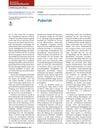 November 2019 in “Monatsschrift Kinderheilkunde”
November 2019 in “Monatsschrift Kinderheilkunde” The document concludes that pediatricians play a vital role in supporting adolescents through puberty and should enhance their competence in this area.
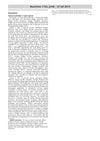 July 2019 in “Reactions Weekly”
July 2019 in “Reactions Weekly” Two women experienced temporary hair loss and other side effects from imiquimod treatment for cervical issues, which stopped after ending the treatment.
 June 2014 in “Basic & Clinical Pharmacology & Toxicology”
June 2014 in “Basic & Clinical Pharmacology & Toxicology” Some plant extracts may treat livestock diseases, certain animal treatments are safe and effective, but more research on drug safety and resistance is needed.
 January 2008 in “The European Journal of Contraception & Reproductive Health Care”
January 2008 in “The European Journal of Contraception & Reproductive Health Care” Non-daily contraceptives cause fewer side effects and are more satisfying to women, and certain oral contraceptives can treat acne and seborrhoea, with a combination of chlormadinone acetate and ethinyl estradiol being highly effective and safe.
 December 2006 in “Annales D Endocrinologie”
December 2006 in “Annales D Endocrinologie” Estrogen-progestin contraception lowers ovarian, endometrial, and colon cancer risk but may raise breast and cervical cancer risk, helps with menstrual and acne issues, and new methods are as effective as pills. Metformin helps overweight women with PCOS and insulin resistance, and dopamine agonists treat prolactinomas.
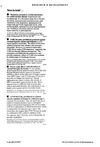 July 1993 in “Inpharma Weekly”
July 1993 in “Inpharma Weekly” Dicentrine reduced heart disease risk factors in rats, T-588 protected mice brains without side effects, Provir blocked herpes virus and lessened mouse symptoms, and LY191704 could treat hair loss and prostate issues.
 48 citations,
May 2012 in “Journal of Midwifery & Women's Health”
48 citations,
May 2012 in “Journal of Midwifery & Women's Health” Polycystic Ovary Syndrome is common but often undiagnosed, and early treatment is important to prevent health problems.
 12 citations,
October 2018 in “International Journal of Women's Dermatology”
12 citations,
October 2018 in “International Journal of Women's Dermatology” Hormone therapy in transgender women can affect hair growth and acne, and there are specific skin issues related to gender-affirming surgery, but more research is needed on their dermatological health.
 January 2023 in “Revista Da Associacao Medica Brasileira”
January 2023 in “Revista Da Associacao Medica Brasileira” The document concludes that women's health needs a holistic approach, considering all life stages, promoting lifestyle changes, regular exercise, proper diet, and vaccinations, with health professionals playing a key role in education and guidance.

Doctors recommend postoperative radiation for male breast cancer, advise against testosterone for vasomotor symptoms post-adrenalectomy, suggest non-hormonal treatments for atrophic vaginitis after mastectomy, note no specific treatment for anticoagulant-induced hair loss, and call for more research on silicosis from silicon carbide exposure.
 June 2003 in “Obstetrical & Gynecological Survey”
June 2003 in “Obstetrical & Gynecological Survey” Postmenopausal ovary stromal cells have a unique makeup and limited steroid production, suggesting androgens come from the adrenal gland.
 May 2019 in “The Journal of Sexual Medicine”
May 2019 in “The Journal of Sexual Medicine” Drinking alcohol before taking flibanserin does not increase the risk of severe low blood pressure or fainting.
 January 2016 in “Springer eBooks”
January 2016 in “Springer eBooks” A 19-year-old male with delayed puberty was successfully treated for a condition that prevents normal hormone production.
 176 citations,
August 1981 in “JAMA”
176 citations,
August 1981 in “JAMA” Toxic Shock Syndrome mainly affects menstruating women, can recur, and is linked to staph bacteria, with rapid treatment being crucial.
 28 citations,
May 2013 in “The Journal of Steroid Biochemistry and Molecular Biology”
28 citations,
May 2013 in “The Journal of Steroid Biochemistry and Molecular Biology” Testosterone therapy can improve sexual desire and function in postmenopausal women but should be used cautiously and not based solely on testosterone levels.
 14 citations,
January 2014 in “International Journal of Dermatology”
14 citations,
January 2014 in “International Journal of Dermatology” Minoxidil with Korean red ginseng improves hair density and thickness more than minoxidil alone.
 6 citations,
January 2014 in “Journal of pediatric endocrinology & metabolism/Journal of pediatric endocrinology and metabolism”
6 citations,
January 2014 in “Journal of pediatric endocrinology & metabolism/Journal of pediatric endocrinology and metabolism” Three siblings with a genetic form of rickets showed different symptoms of the disease.
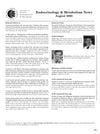 6 citations,
August 2005 in “The Journal of Clinical Endocrinology & Metabolism”
6 citations,
August 2005 in “The Journal of Clinical Endocrinology & Metabolism” Finasteride causes temporary cell death in BPH tissues.
 5 citations,
June 2019 in “JAAD Case Reports”
5 citations,
June 2019 in “JAAD Case Reports” Imiquimod used intravaginally for cervical issues can cause temporary hair loss, especially if severe side effects occur.
 5 citations,
January 2006 in “Journal of obstetrics and gynaecology”
5 citations,
January 2006 in “Journal of obstetrics and gynaecology” Metformin can cause hair loss in some women with PCOS.
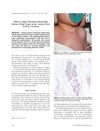 3 citations,
May 2013 in “Pediatric Dermatology”
3 citations,
May 2013 in “Pediatric Dermatology” A newborn girl had a rare case of salivary gland tissue on her chest, which was safely removed.
 1 citations,
October 2000 in “Pediatrics in Review”
1 citations,
October 2000 in “Pediatrics in Review” The document says that hookworms are treated with mebendazole and stress-related hair loss usually gets better in 6 months, while other hair loss types have specific treatments.





























